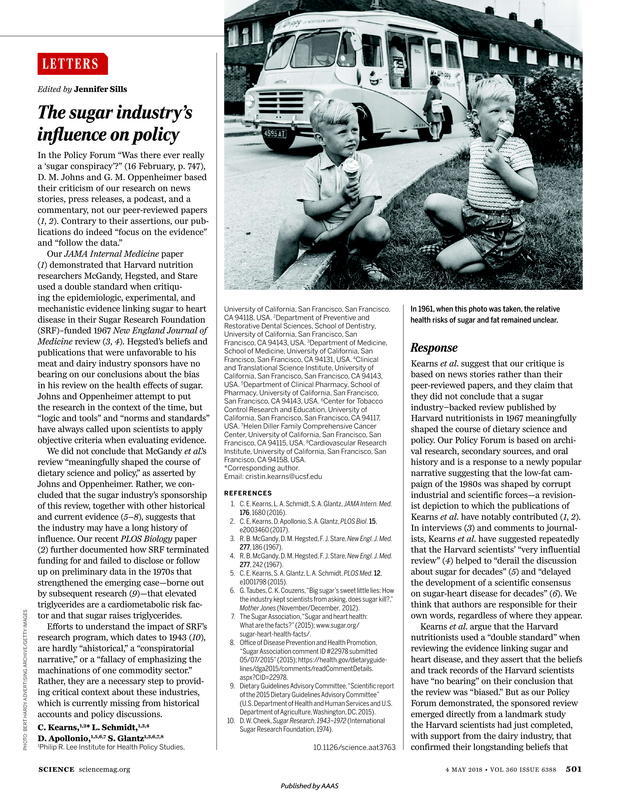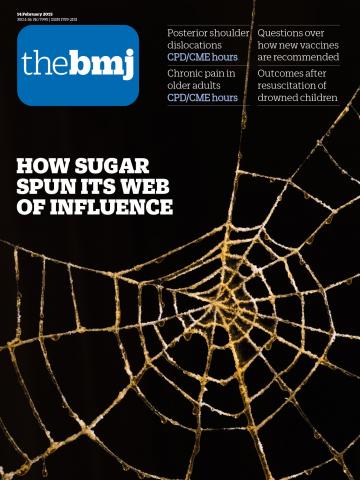

Sugar: spinning a web of influence
BMJ 2015;350:h231
Public health scientists are involved with the food companies being blamed for the obesity crisis, reports Jonathan Gornall. An investigation by The BMJ has uncovered evidence of the extraordinary extent to which key public health experts are involved with the sugar industry and related companies responsible for many of the products blamed for the obesity crisis through research grants, consultancy fees, and other forms of funding.
Among the main targets in the United Kingdom for an industry facing increasing pressure from government to reduce the health harms caused by its products are researchers working on nutrition issues for two key government funded organizations—the Scientific Advisory Committee on Nutrition and the Medical Research Council’s Human Nutrition Research unit at Cambridge. The BMJ has found that for more than a decade funding from industry has flowed to scientists involved with the research unit. Scientists working on Medical Research Council (MRC) projects have received research funding from organizations including Coca-Cola, PepsiCo, Nestlé, the Institute of Brewing and Distilling, Weight Watchers International, NutriLicious (a public relations firm specializing in conveying “nutrition and health messages” for the food industry), Sainsbury’s, W K Kellogg Institute, and GlaxoSmithKline.
Others received consultancy fees from Boots, Coca-Cola, Cereal Partners UK, Mars, and Unilever Foods. They have also sat on advisory boards for Coca-Cola, the Food and Drink Federation, and the Institute of Grocery Distributors.
Making China safe for Coke: how Coca-Cola shaped obesity science and policy in China
BMJ 2019;364:k5050
Susan Greenhalgh investigates how, faced with shrinking Western markets, the soft drink giant sought to secure sales and build its image in China
Ever since 2001, when the US surgeon general called on all Americans to fight the newly named epidemic of obesity, the soft drink industry has had a target on its back. Recent investigations have shown how it is fighting back. From blocking New York City’s ban on large drink sizes to lobbying against soda restrictions and funding exercise specialists to promote physical activity as the best solution to obesity, “Big Soda” has been defending its interests. Yet with US soda sales plummeting, the industry is losing the battle. As the US market shrinks, the industry has set its eyes on the global south, especially rapidly developing countries like China, with vast undeveloped markets for products associated with “modernity” and “the American way of life.” Until recently, China’s hyper-marketized political economy and pro-Western culture have enabled some multinational firms, especially politically well-connected ones, to manage the risks and restrictions and prosper.
This is particularly true for Big Soda’s largest and most famous brand, Coca-Cola. China is now Coke’s third largest market by volume. And with its vast population, huge growth potential remains, making it “critically important to the future growth of our business,” according to former Coke chief executive Muhtar Kent.
But Coke’s recipe for success in China relies on more than cultivating political relationships and strategic localization of products and marketing. Through a complex web of institutional, financial, and personal links, Coke has been able to influence China’s health policies. The company has cleverly maneuvered itself into a position of behind-the-scenes power that ensures that government policy to fight the growing obesity epidemic does not undermine its image.


